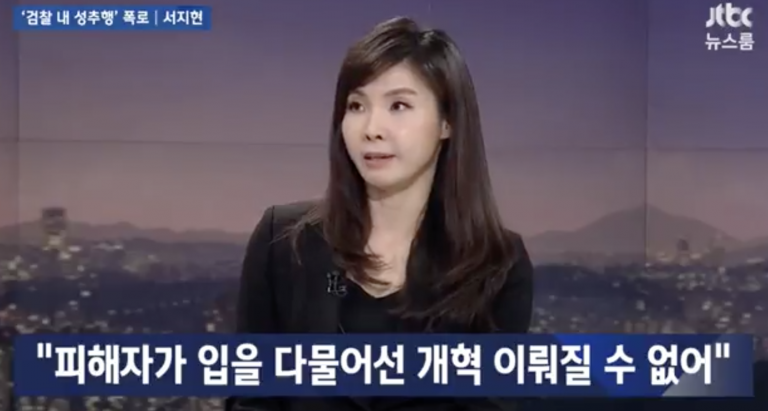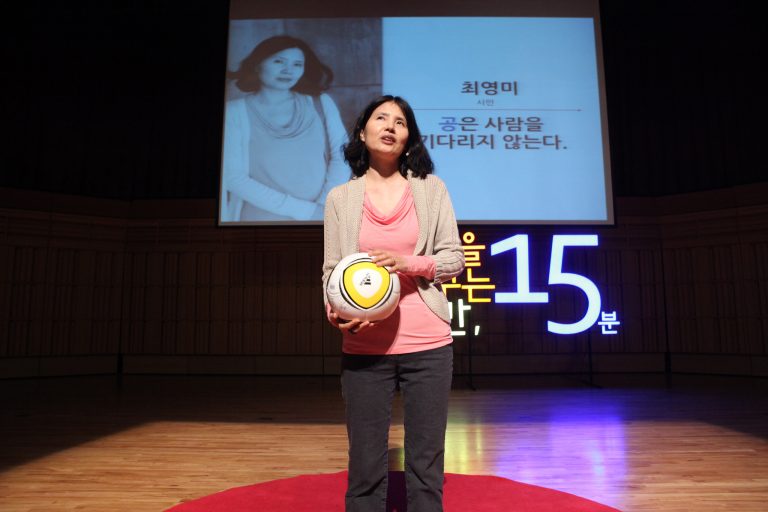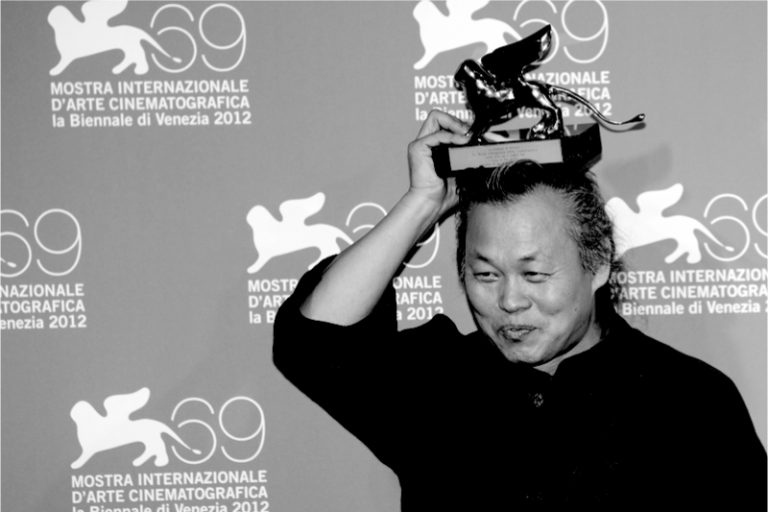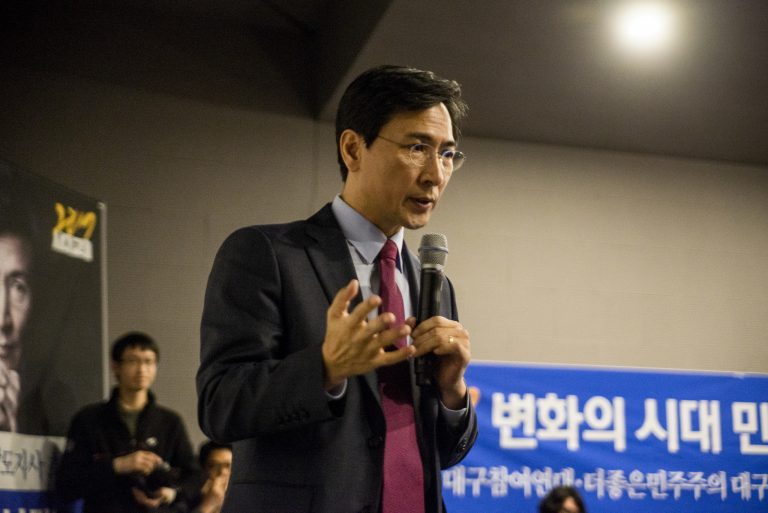Following all the breaking news on the #MeToo movement in Korea and distinguishing facts from allegations and gossip is no small challenge. The hashtag movement that started in January as a tidal wave of solidarity now seems muted and muddled with politicization, hasty judgments, suicides, and backlash. Here’s an overview of some of the major talking points of the year so far, across various sectors of society. If you’re already familiar with the specifics, perhaps skip ahead to the second half, where I take a look at cultural dynamics.
‘Beginnings’

Seo Ji-hyun speaking on JTBC Newsroom on Jan 29, 2018. (Caption translation: ‘Reform is not possible when victims stay silent.’) | Flickr/코란도
This January 29, a female prosecutor revealed herself to be a victim of workplace sexual harassment through an interview on JTBC Newsroom. A few days prior Seo Ji-hyun had posted on the Prosecutor’s Office internal bulletin board about being groped by Ahn Tae-gun, a Justice Ministry official at the time, at a funeral in 2010. With the “MeToo” hashtag, she uploaded evidence of unfair demotion from the Seoul office to rural Tongyeong after the harassment. Seo claims the reassignment stemmed from her request for an apology and was the result of an intentional cover-up by Ahn and a senior officer named Choi Gyo-il. Choi is now a representative of the Liberty Korea Pary.
Seo stayed on at the male-dominated institution, conflicted and blaming herself for the incident. According to her interview, the reason she revealed her identity and experience so publicly was to promote organizational reform, demand an apology, and stand in solidarity with other victims of power-related sexual harassment.
Two days later a special investigation team was launched to probe Seo’s and other cases of sexual abuse within the Prosecutor’s Office. The rest of the media took up the story immediately, heralding the interview as the beginning of the Korean #MeToo movement.
As other revelations followed, legal proceedings over workplace disadvantages[1] have dragged on. Ahn denies all charges and claims he was unaware of the allegations of sexual harassment until the media reports, and that Seo had not even been on his radar.
Seo has continued to push forward and has spoken against the backlash from other prosecutors. She was promoted to the position of assistant chief prosecutor on July 13th and testified on July 16th.
Literature

The poet Choi Young-mi giving a talk on the cable show Change the World in 15 Minutes in 2011 | Flickr/세상을바꾸는시간 15분
In early February, again on JTBC Newsroom, the poet Choi Young-mi spoke about her poem “Monster”. Published last year, it accuses an older poet “En” of sexually abusing young female poets. “En” was soon identified as the famed Ko Un.
That the renowned literary figure—promoted annually as a candidate for the Nobel Prize in Literature—might be a habitual molester came as a shock. Other poets have stepped up in support, describing Ko Un’s behavior as an open secret in literary circles. Given Ko’s status and influence in the industry, Choi suspects that her vocal resistance to the inappropriate advances led directly to the derailment of her career. Ko did not initially respond beyond a brief phone interview expressing regret for “unintended harm some 30 years ago”. Later, however, he issued a statement to The Guardian via his UK publisher firmly denying any “charges of habitual misconduct”.
Since the news broke, the permanent library installation in Seoul dedicated to him has been taken down, and his poems and essays will be excised from high school textbooks. Choi has said that she is opposed to this decision and that, “If Ko Un’s poems have spirit they will survive whether they are excised from textbooks or not”. She received the Gender Equality Award from the Seoul Metropolitan City on July 3. On July 17 Ko filed defamation suits against Choi and Dong-A Ilbo, which carried the first interview with Choi.
Such a hashtag movement is actually not new in Korean literary circles. Over a few weeks in 2016, several prominent poets were accused of sexual abuse against younger aspiring poets. The attention was relatively short-lived, and the outcomes of many of the allegations remain unclear. Of the 16 people accused of sexual harassment or abuse, seven were questioned by the Writers Association of Korea with a view to disciplinary action, but all seven then left the organization, ending the probe.
Theater and cinema
Accusations of power-related sexual abuse spilled over to other spheres as well. Lee Yoon-taek, the award-winning director of top theater group Yeonheedan, is suspected of 62 counts of harassment and assault of actresses in his group from 1999 to 2016. Of those, 21 are due for criminal investigations, in line with the statute of limitations. Lee at first denied the charges, later said that he didn’t remember, and then claimed his behavior part of his acting lessons. He was arrested on February 23, 38 days after the first accusation came to light. At the first court hearing on June 20, Lee denied there was any use of force, and claimed everything happened with consent.

Kim Ki-duk was awarded the Golden Lion at the 2012 Venice International Film Festival | Shutterstock
The theater scene is not as publicly prominent as the cinema scene, but many of the personnel overlap. The film, TV, and stage actor Cho Jae-hyun was accused of sexual abuse on social media by the actress Choi Yul on February 23. Cho issued an apology and stepped down from his current show on tvN, but other accusations against him surfaced in connection with the film director Kim Ki-duk, an industry giant (Spring, Summer, Fall, Winter… and Spring; 3-Iron; Pieta).
Three anonymous women accused Kim and Cho of habitual abuse and rape on PD Notebook, an investigative program on the network channel MBC. Kim has stated that he never went further than kissing and “did not use his position as a film director to satisfy his personal needs”. But both Lee and Kim remain accused of professionally penalizing women who refused their advances. Cho had initially issued an apology committing to a period of penitent self-reflection, but on June 22 he changed course stating that he did not sexually assault or rape anyone. Kim also denies all charges and has sued PD Notebook for libel.
The actor Jo Min-ki was accused of sexual assault by eight people, starting on February 20, most of them his drama students at Cheongjoo University. He was released from his faculty position and scheduled for police questioning on March 12, only to be found hanged on March 9.
There was also a rare case involving a woman perpetrator. The film director Lee Hyun-joo was found guilty of sexually abusing another female director. Lee protested the court ruling, but further revelations of her systematic attempts to hide her behavior resulted in her being booted out of the Director’s Guild of Korea.
Universities
Universities and their daenamusup, or anonymous social media-based online forums, had already seen posts on sexual misconduct by professors, but the #MeToo movement spurred momentum. Students have been putting up posters and post-it notes with messages like “Me too” and “Get out” on and around the office doors of accused faculty members. One of the more publicized cases is that of a professor at Hankuk University of Foreign Studies, accused of sexual harassment on social media on March 14. The university authorities met with him on the 16th, and the next day he was found hanged in his apartment. The school has ceased further investigations.
The case of Ha Il-ji, the author and professor of literature at Dongduk Women’s University, is still developing. In March, students accused Ha of mocking victims of sexual abuse and the #MeToo movement itself. One female student then came forward alleging sexual assault. Ha submitted his resignation in the mounting uproar but refused to apologize for his comments or to admit to the assault.
The student reported the case to the National Human Rights Commission of Korea which eventually recommended disciplinary measures. Ha, meanwhile, has sued the student for defamation and blackmail, and the university has said it will wait on the court result before taking any action. On July 22, the prosecutor’s office began its own investigation into the assault charge.
Politics

Ahn Hee-jung in 2017 | Flickr/MoolrinPhoto
If there has been one decisive moment in the entire Korean #MeToo movement, it was the accusation against Ahn Hee-jung of the Democratic Party on March 5. In a primetime interview on JTBC Newsroom, Kim Ji-eun, his secretary, accused the governor of South Chungcheong Province of rape. The accusations against Ahn shocked many who believed in his clean image and vocal support for gender rights. Ahn was a primary candidate in 2017, and he remained a rising star even after losing to Moon Jae-in. After the accusations, he was soon dropped by his party and resigned from his post as governor.
Today this remains the most publicized #MeToo case. Throughout months of proceedings Kim had asked to keep her side of the statements closed to the public, while statements from Ahn’s legal team and witnesses, including his wife, were made public, inviting rampant reporting of salacious details of Kim’s personal life and psychological state. Ahn had admitted to the sexual affair but maintained it was consensual, highlighting that Kim is a capable adult with agency (well-educated and decisive), while at the same time questioning her personality as somewhat obsessive. Kim’s case is that Ahn was authoritarian in all his professional relationships, and nobody dared oppose him, and that she was sexually assaulted under professional pressure. On August 14 the court found Ahn not guilty as charged due to lack of evidence for Ahn violating Kim’s ‘sexual agency’[2]). The court decided that, based on the existing law, Kim had not given clear non-consent to Ahn’s advances. The decision has spurred criticism from politicians and discussions on insufficiencies in the current laws on sexual assault. Women’s rights groups have rapidly mobilized for a large scale protest this coming weekend.
Several other Democratic Party representatives have been accused leading to each resigning and withdrawing from June’s local elections. Most prominent was the loss of two of the party’s expected candidates for mayor of Seoul, Min Byung-doo and Chung Bong-ju. On March 10, *News Tapa* reported that Min had committed sexual misconduct in 2008 against a businesswoman at a karaoke bar. Despite his party leadership advice to wait, Min promptly resigned from politics, only to return two months later. On July 16 he was elected as the Chairman of the National Policy Committee of the National Assembly. Min assumed the posture of humble self-reflection while other parties criticized Min’s party for neglecting a possible crime.
Chung Bong-ju was accused of sexual misconduct against a female reporter (who at the time was a university student) at a hotel in 2011. The news was reported by Pressian, a left-leaning online news site, on March 13, a day before Chung would have announced his bid for Seoul mayor. Chung held a press conference pointing out inconsistencies in Pressian’s reporting, adding that the report was a “deliberate nationwide con” to prevent his candidacy. Countersuits and truth-games continued until Chung finally admitted, given photo and credit card records, that he was indeed at the hotel at the exact time of the alleged incident. Chung still maintains he does not remember what happened at the hotel, but the ongoing investigations are unfolding in favor of the Pressian reporters who have accused Chung of defamation.
Meanwhile the Liberty Korea Party leader Hong Joon-pyo, who wrote in his 2005 memoir of assisting in an attempted date rape in his 20s, tried to capitalize on the moment by claiming to support the #MeToo movement. But by the time of the local elections in June, the recent summit with North Korea overshadowed much other issues, delivering a historic victory for the DPK. Only two city and district heads were elected from the LKP.
What’s different?
What distinguishes Korea’s #MeToo movement from others? There are a few major points.
While many cases of sexual harassment happen in private spaces such as hotel rooms, many work-related incidents happen in alarmingly public places such as office dinners, karaoke bars, or even at a funeral in Seo’s case, where the silence of other witnesses serves to normalize incident. In addition, such perpetrators are not only those at the pinnacle of industry hierarchies with Weinstein-like influence; simply being higher up a company ladder can embolden someone to commit sexual misconduct and then threaten workplace disadvantages. These instances are not limited to a few individual deviants but are deeply rooted and systemic.
Also different is that the movement has seen several suicides by alleged perpetrators of harassment. To be clear: there have been many suicides by victims over the years, most famously that of actress Jang Ja-yeon in 2009, who left behind a list of high profile persons who had sexually exploited her. This time, however, the identities of the perpetrators have quickly become national talking points, and the aforementioned actor and professor committed suicide shortly after investigations began.
Although Korea is already all too familiar with the reality of suicide (the national rate is the highest among OECD countries), these two deaths nevertheless came as a shock. Suicide has become an undeniable aspect of the unfolding movement, deepening the pain. And without wishing to make light of the passing of the accused, the deaths in effect reverse the blame—back onto the accusers. The accusers may not see any conclusion to the initial legal investigations. They may instead just be attacked for instigating murderous witch-hunts.
The backlash against the movement is particularly savage, with conspiracy theories and general misogyny increasingly rampant on social media and in notorious online forums. One crowd funding site attempted to publish Kim Ji Hoon, Born 1990, a book parodying Cho Nam Joo’s 2016 bestseller Kim Ji Young, Born 1982. The original book, describing the plight of a typical Korean woman, sparked controversy again when male fans decried the K-pop singer Irene (of Red Velvet) for saying she had read it. There is also #YouToo, a half-joking social-media movement for the victims of false accusations.
And doubts about the movement have now spread to the wider population. Particularly illustrative is the outrage against Womad, an extremist online feminist forum. One ‘sacrilegious’ post attacking Catholic communion wafers resulted in a Blue House petition calling for the closure of the forum. And a female nude model who uploaded a secretly taken photograph of a male nude model was controversially jailed on August 14.
What started out as a grassroots drive for solidarity and support for victims of sexual abuse and systemic abuse of power has at times, intentionally or not, become a political tool. Some decry the movement as outrage-driven, groundless character assassination against men who should be innocent until proven guilty.
Which brings the discussion to the issue of journalistic standards and how Korean society reads the news. How the media reports news of sexual abuse sets the tone and frames the discourse. When Koreans encounter breaking news on their smartphones, the visual effect of seeing almost identical pictures and click-bait titles automatically curated to fill news portals is overwhelming, multiplying the sense of urgency and severity.
The Journalist Association of Korea makes the case that the top two problems in #MeToo coverage are the lack of respect for the rights and privacy of the victims, and the sensationalism of the reporting. The Korean Women’s Association for Communication Studies agrees and is also concerned by reporting that blames victims for the consequences that perpetrators and industries now face. News reports are introducing the “(Mike) Pence Rule”—the gender discriminatory practice of avoiding one-on-one meetings alone with the opposite sex, even in professional situations—and attributing its emergence to the #MeToo movement. KWACS sees the underlying issue as systemic gender discrimination in a male-dominated news industry.
Many articles on abuse allegations simply rehash short quotes of latest statements and social media posts, with insufficient background information. The fragmented reporting frames issues as truth-games by two parties that stand on equal ground, with equal power. The reality of course is that victims of sexual abuse have much more to lose, both socially and professionally. A basic understanding of this society’s gender relations is necessary to discern reality in the deluge of news, and there are few places to find it.
In addition, there is confusion over the terms used in daily conversation. Is it possible for the general public to distinguish between the various types of sexual misconduct in their daily diet of news without exacerbating the pain of the victims? When gender and sexuality are still taboo concepts, testimonies that euphemistically imply sexual harassment or assault without using concrete words like “groping” or “rape” can be variously interpreted by onlookers, further derailing the conversation.
On the legal front, the Supreme Prosecutor’s Office has revised its sexual violence investigation manual to cease investigations into charges of libel by the victim of sexual assault until after the assault case reaches a conclusion. Those accused of sexual assault often file simultaneous countersuits of libel to claim their innocence and threaten the victims of assault. Clarifying the order of the process helps protect the victims from legal backlash.
Today, the suicides, the apparent crimes of left-wing politicians, and the politicization of the movement have combined to dampen the initial surge of the #MeToo movement. Women’s movements and gender-based violence have continued to decorate the headlines, though, with the issue of hidden cameras (molca) in public restrooms, and women’s marches protesting allegedly biased investigations into recent cases. For the sake of the courageous people who voiced their experiences and solidarity, the movement should be more than voyeuristic consumption or yet another social media outrage against some extreme factions.
Still, there’s plenty of reason for optimism. Gender and feminist issues were gaining currency in Korea long before the US-originated hashtag movement, and this quiet spell will not end discourse entirely. The disparate elements of the Korean #MeToo movement seem ready for more long-term, rigorous public discussions on gender, discrimination, and power relations.
This article was originally published on April 17, 2018, and was updated to reflect new developments on August 16. Have a question for the writer? Send us a mail or sign up for the newsletter.
More at The Dissolve
- Women are half the population but most newspaper sources are still male
- The mind behind BTS on balancing artistry and business
- 'Double care' and 'triple care': The middle-aged supporting their parents, adult children and even grandchildren
- The one about bras
- Playwright and director Choi ZinA: “Uncomfortable? Unfamiliar? Then I’ve done my part.”

